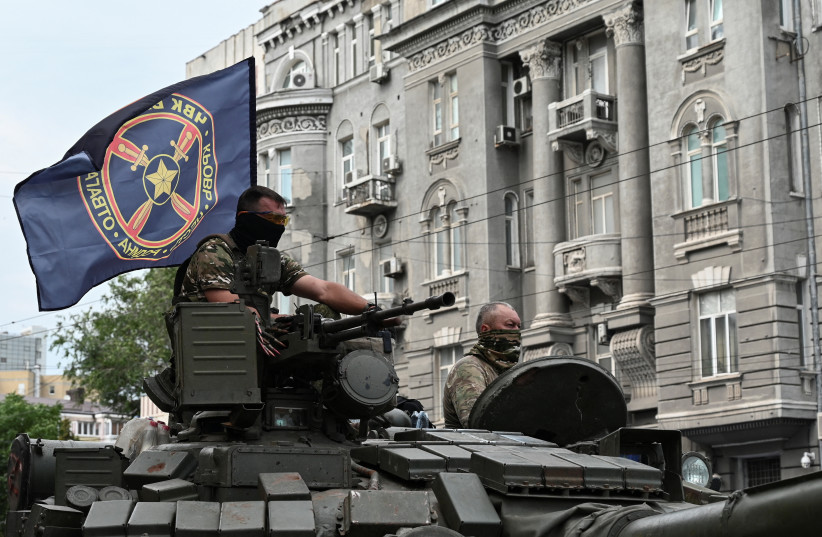What led to Wagner’s revolt in Russia? -analysis
The Wagner private mercenary company’s mutiny in Russia over the weekend was more of a revolt against the Defense Ministry rather than President Vladimir Putin, as the feud between the two military groups escalated over independence and operational conduct.
Wagner’s head Yevgeny Prigozhin seizing of military bases and advance on Moscow was preceded by an alleged missile strike by the Russian military on the flanks of Wagner forces, which Wagner channels claimed had killed many mercenaries. The attack has yet to have been confirmed by mainstream sources, and could just as easily be disinformation to lend greater justification for the mutiny. If there was such a strike, it would have been an act of open conflict in the cold war between Prigozhin and the Defense Ministry.
Prigozhin statements as he launched the limited revolt showed that it was the Russian military brass and Shoigu that were the focus of his ire, rather than Putin and the government as a whole.
The mercenary leader released a video on Friday in which he attacked the Defense Ministry and Defense Minister Sergei Shoigu as misleading the public and Putin about the war. Prigozhin said that the ministry had started the war because they claimed that there was aggression from NATO and Ukraine.
 Fighters of Wagner private mercenary group stand on a tank outside a local circus near the headquarters of the Southern Military District in the city of Rostov-on-Don, Russia, June 24, 2023 (credit: REUTERS/STRINGER)
Fighters of Wagner private mercenary group stand on a tank outside a local circus near the headquarters of the Southern Military District in the city of Rostov-on-Don, Russia, June 24, 2023 (credit: REUTERS/STRINGER)Prigozhin also asserted that the Russian brass had embezzled funds for forces stationed in the rebel Donetsk and Luhansk regions. Oligarchs and other officials had also “plundered” the regions.
Singling out politicians
Prigozhin singled out Russian Chief of Staff Valery Gerasimov and Shoigu for causing the death of tens of thousands of Russians in failed operations on Friday.
“For the victory of Russia, you need to stop lying, stop stealing and stop thinking only about your well-being and your own places, but think about the soldiers, about their lives,” said Prigozhin, who said soldiers were being sent into battle without ammunition.
While the oligarch, often called “Putin’s chef” due to his catering company contracts with the government, has framed his mutiny as being in the service of soldier’s rights. Yet like the missile strike, this may be more dinner theater, or garnish to the main dish. The source of the strife is likely more personal.
Shoigu and Prigozhin have been in a bitter political rivalry since the early days of the war. Prigozhin has been heavily critical of Shoigu and Kremlin brass for their competency in the war, which he attributed just as many Russian failures to as he has victories to his own forces. Prigozhin has claimed that his troops have been starved of artillery shells by the Russian Defense Ministry. Other reports indicate Wagner had been denied access to prisons for recruitment by the ministry.
While previously Wagner and other mercenary groups enjoyed a great deal of autonomy, a decree was set to require them to sign contracts with the Defense Ministry by the coming Saturday. Prigozhin refused. The mutiny in large part seems to have been aimed at securing his militia’s independence.
“They wanted to disband the Wagner military company. We embarked on a march of justice on June 23,” Prigozhin said on Saturday.
This “march of justice” had called for the ousting of Shoigu and his staff.
Ukrainian intelligence has long predicted armed conflict between different factions in the Russian military complex. The Ukrainian National Resistance Center has claimed that Prigozhin had wanted to take the place of Shoigu as the Defense Minister.
On Saturday night, after negotiations with Belarus Prigozhin seems to have stopped short of his alleged aspirations of replacing Shoigu by force, but it remained to be seen if talks had secured him the autonomy he sought for Wagner.





Comments are closed.